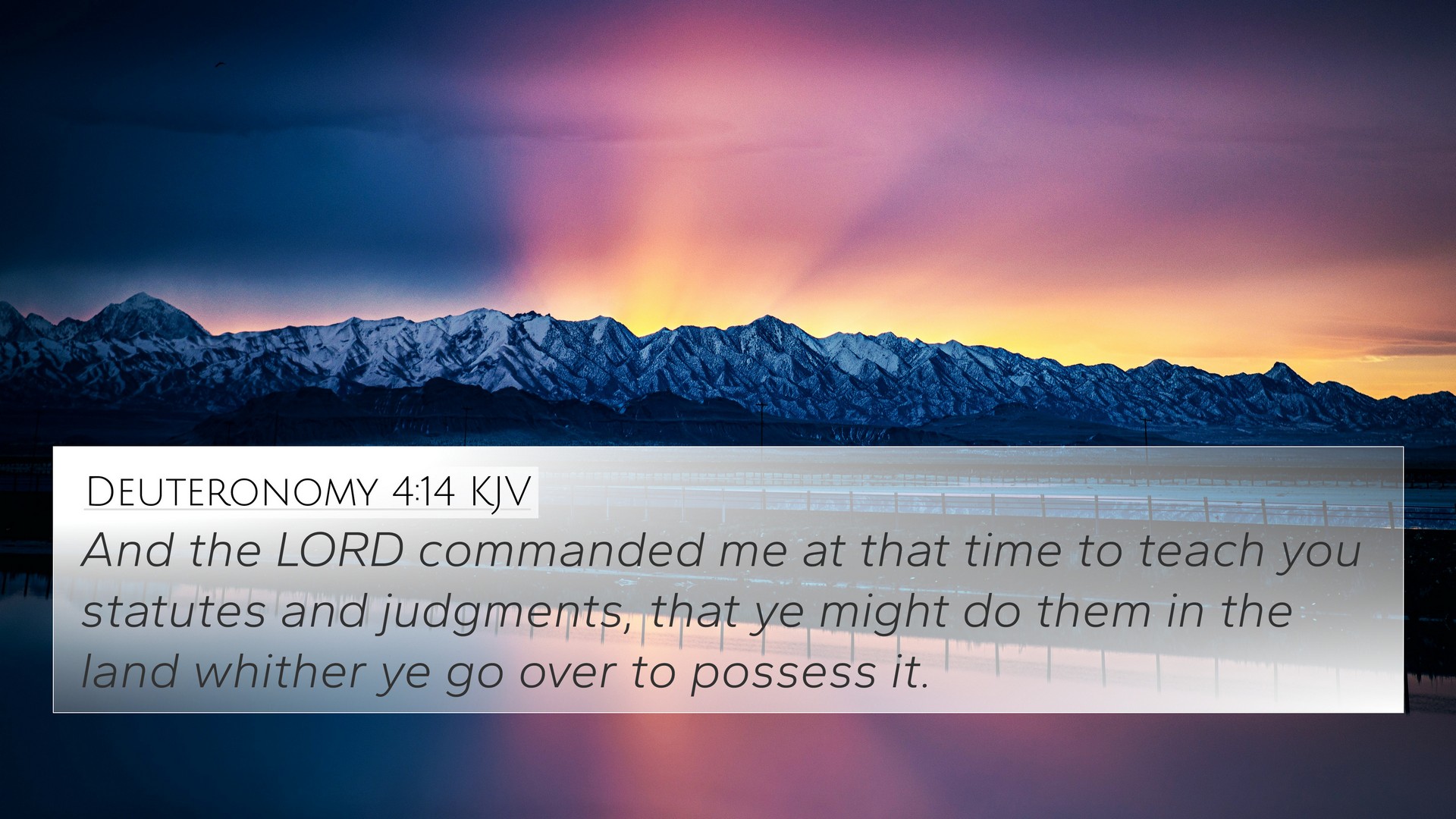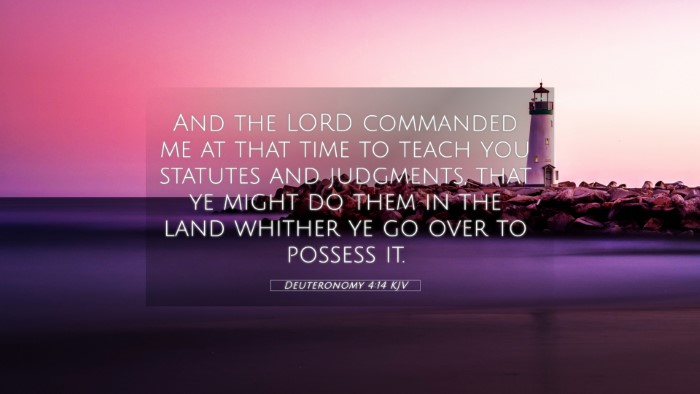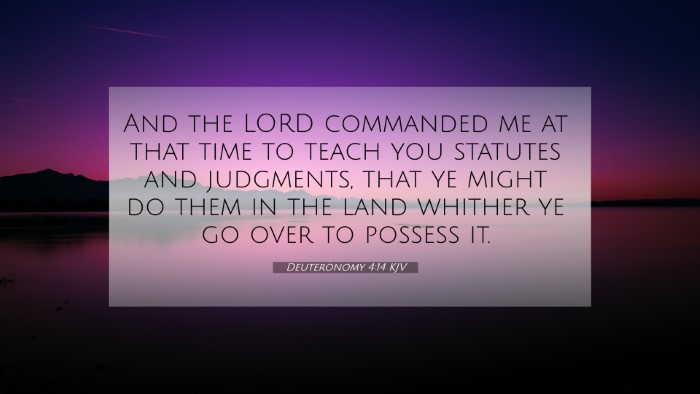Meaning and Interpretation of Deuteronomy 4:14
Verse: Deuteronomy 4:14 - "And the Lord commanded me at that time to teach you statutes and judgments, that ye might do them in the land whither ye go over to possess it."
This verse captures a significant moment when Moses emphasizes the importance of the laws and teachings given by God for the Israelites as they prepare to enter the Promised Land. It's aimed at instructing the people on how to live in accordance with God's will, thereby ensuring their success and wellbeing in the new land.
- Moses’ Role as Teacher: Moses is portrayed as a mediator between God and the people, tasked with the responsibility of teaching.
- Importance of Statutes and Judgments: The laws (statutes) and the penalties for disobedience (judgments) given by God are crucial for maintaining order and righteousness in the community.
- Spiritual and Moral Guidance: The instructions serve not only civil but also spiritual purposes, ensuring the Israelites remain faithful to God's covenant.
- Context of Land Possession: The ‘land’ signifies the inheritance promised by God, exemplifying divine providence and the necessity of adherence to His commandments.
- Preparedness for Future Challenges: By teaching these laws ahead of time, Moses prepares the Israelites for the moral and ethical challenges they may face.
- Emphasis on Obedience: The underlying theme is obedience to God's commands as a prerequisite for receiving His blessings in the Promised Land.
- Legacy of Instruction: This command to teach indicates a tradition of passing down religious and moral teachings through generations.
Insights from Public Domain Commentaries
Matthew Henry: Henry notes the necessity of teaching divine ordinances, emphasizing how God requires His people to be instructed in righteousness. He highlights the eternal relevance of these statutes, suggesting they are foundational for a community that seeks to honor God and ensure a blessed existence.
Albert Barnes: Barnes elaborates on the divine origin of the commandments. He points out that the guidance provided to the Israelites is not merely legalistic but is essential for the cultivation of a faithful and prosperous society. Barnes stresses the critical nature of obedience to these teachings as a condition for well-being in the promised land.
Adam Clarke: Clarke interprets this verse with an emphasis on the necessity of understanding God's laws. He sees the act of teaching as integral to maintaining the covenant relationship between God and Israel, ensuring that the people not only hear but also comprehend and apply God’s regulations in their lives.
Cross References
Deuteronomy 4:14 connects with several other biblical verses that enhance our understanding of its themes:
- Exodus 24:12: God commands Moses to receive the tablets of stone and teachings, illustrating the foundational role of divine law.
- Psalms 119:105: “Thy word is a lamp unto my feet, and a light unto my path.” This verse echoes the significance of God's teachings as guidance in life.
- Joshua 1:8: This verse emphasizes the need to meditate on the law to achieve success and prosperity in the new land.
- Matthew 5:17: Jesus affirms the law, clarifying its relevance and continuation in the New Covenant.
- Romans 3:20: This verse reinforces that understanding the law leads to knowledge of sin, highlighting the moral aspect of God’s commandments.
- 2 Timothy 3:16-17: These verses proclaim that all Scripture is inspired by God and is useful for teaching, further establishing the need for biblical instruction.
- James 1:22: This verse advises believers to be doers of the word, relating to the call for obedience inherent in Deuteronomy 4:14.
Thematic Connections
The teachings encapsulated in Deuteronomy 4:14 resonate throughout the biblical narrative, showcasing a consistent theme of divine instruction leading to covenant faithfulness. The verse illustrates God’s dedication to teaching and guiding His people so they may thrive as His chosen nation:
- God’s Covenant: The laws are part of the covenant relationship established with Israel, underpinning their identity and mission.
- Teaching and Learning: The community is responsible for maintaining the knowledge and practice of these statutes across generations.
- Moral Framework: The teachings in scripture provide a moral compass for believers, guiding them in right living.
- Collective Responsibility: The emphasis on communal learning and obeying God's commands points to the collective nature of faith.
Cross-Referencing Insights
In studying Deuteronomy 4:14, we can also explore tools for Bible cross-referencing that help illuminate further connections:
- Bible Concordance: A comprehensive resource to find verses related to key terms, enhancing understanding of shared themes.
- Bible Cross-Reference Guide: Useful for tracing connections between verses that share similar messages or teachings.
- Cross-reference Bible Study: Techniques in examining relationships between passages can deepen one’s grasp of scripture.
- Bible Chain References: A method to create links between verses, facilitating easy navigation through biblical concepts.
Conclusion
In conclusion, Deuteronomy 4:14 serves not just as a historical account, but as a timeless directive for believers regarding the significance of obeying God’s voice and statutes. The teachings therein connect deeply with the overall narrative of the Bible, reaffirming the essential nature of divine instruction in a faithful community. By employing tools for Bible cross-referencing and engaging in comparative analysis, one can uncover the profound inter-Biblical dialogue that enriches faith and promotes a deeper understanding of scripture.




